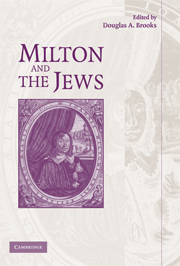Book contents
- Frontmatter
- Contents
- Acknowledgments
- Contributors
- 1 Introduction: Milton and the Jews: “A Project never so seasonable, and necessary, as now!”
- 2 England, Israel, and the Jews in Milton's Prose, 1649–1660
- 3 Milton's Peculiar Nation
- 4 Making Use of the Jews: Milton and Philo-Semitism
- 5 Milton and Solomonic Education
- 6 T. S. Eliot, Anti-Semitism, and the Milton Controversy
- 7 A Metaphorical Jew: The Carnal, the Literal, and the Miltonic
- 8 “The people of Asia and with them the Jews”: Israel, Asia, and England in Milton's Writings
- 9 Returning to Egypt: “The Jew,” “the Turk,” and the English Republic
- Select Bibliography
- Index
9 - Returning to Egypt: “The Jew,” “the Turk,” and the English Republic
Published online by Cambridge University Press: 02 July 2009
- Frontmatter
- Contents
- Acknowledgments
- Contributors
- 1 Introduction: Milton and the Jews: “A Project never so seasonable, and necessary, as now!”
- 2 England, Israel, and the Jews in Milton's Prose, 1649–1660
- 3 Milton's Peculiar Nation
- 4 Making Use of the Jews: Milton and Philo-Semitism
- 5 Milton and Solomonic Education
- 6 T. S. Eliot, Anti-Semitism, and the Milton Controversy
- 7 A Metaphorical Jew: The Carnal, the Literal, and the Miltonic
- 8 “The people of Asia and with them the Jews”: Israel, Asia, and England in Milton's Writings
- 9 Returning to Egypt: “The Jew,” “the Turk,” and the English Republic
- Select Bibliography
- Index
Summary
In his commentary on Galatians 4.8–9, Luther describes Judaism, Islam, Catholicism, and even radical Protestant sectarianism as outwardly different but in fact identical ceremonial religions, differing from each other only in things indifferent: “There is a difference of the persons, the places, rites, religions, workes and worshippings: notwithstanding there is all one and the same reason, the same heart, opinion, and cogitation in them all.” Luther insists that these faiths differ only in the particular ceremonial laws they think themselves enjoined to fulfill, but not in the essential doctrine of salvation by the fulfillment of the law. “The Jewes imagine this to be ye will of God, if they worship him according to the rule of Moses lawe,” he writes; “the Turke if he obserue his Alcoran: the Monke if he kepe his order and performe his vowes. But all these are deceaued.” All are idolaters, making an idol of the law of God – a more sophisticated idolatry than the worship of golden calves, and all the more subtly dangerous for that reason. Yet it is idolatry nevertheless, “a very dreame, a bewytching and illusion of the heart” (P6r). A version of the Pauline discourse of inward faith here renders superfluous all outward, worldly, or bodily practices: it nullifies all distinctions between different ritualisms, in the service of the one difference that matters, the difference of works from faith, circumcusion from the “circumcision of the heart.”
- Type
- Chapter
- Information
- Milton and the Jews , pp. 178 - 200Publisher: Cambridge University PressPrint publication year: 2008



